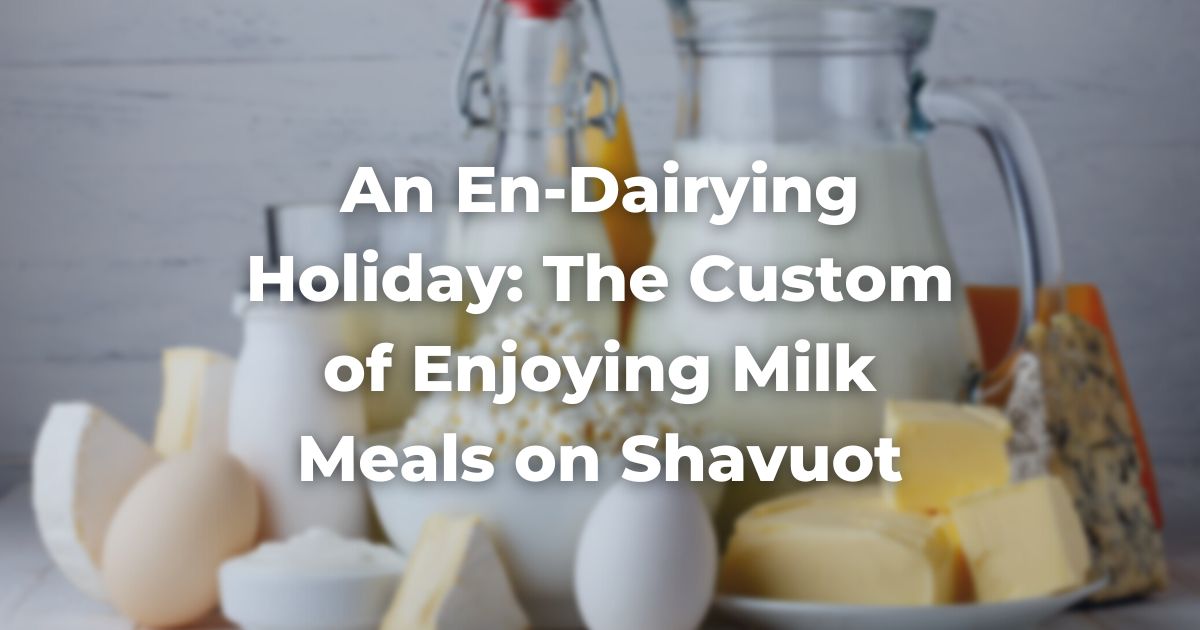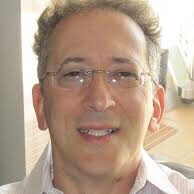Table of Contents
What do you call a cow that won’t give milk?
–A milk dud.
What do you get when you cross cows and ducks?
–Milk and quackers.
What do you call a cow getting on a scale?
–A milky weigh.
What do you get when a cow gets stuck in an earthquake?
–A milkshake.
What does a cow do with extra milk?
–Gives it to udder people.
What gives milk, goes “moo, moo” and makes all of your dreams come true?
–Your dairy godmother.
We may be lactose intolerant, but we Jews love our dairy.
Many of us have Shavuot memories of blintzes, lokshen kugel (noodle pudding), and cheesecake. So let us ponder some of the reasons given for the custom of eating milk products on Shavuot.
Let us note that the very number of midrashimThis word is used in two ways, as both a concept and a literature. As a concept, midrash is the expansive interpretation of biblical texts. The term is used to describe the practice of rabbinic interpretation. As a text, it refers to specific collections of interpretations, particularly from the third to ninth centuries in the Land of Israel and Babylonia. Plural: Midrashim
Read more and interpretations points to the probability that the original reason, if there ever was one, has been lost somewhere along the way. Since we associate Shavuot with the giving of the tablets of the Ten Commandments, I will provide ten suggestions.
Reason #1: The Torah Is Like Milk, and Milk Is Life-Enhancing
Torah is likened to milk: “Like honey and milk [the Torah] lies under your tongue.” (Song of Songs 4:11)
Just as milk has the ability to fully sustain a nursing baby, so, too, the TorahRefers to the first five books of the Hebrew Bible, the Tanakh, also called the Five Books of Moses, Pentateuch or the Hebrew equivalent, Humash. This is also called the Written Torah. The term may also refer to teachings that expound on Jewish tradition. Read more provides all the “nourishment” necessary for the human soul. Torah, then, is like milk, for it encompasses within it all the sustenance that a person needs for vitality and growth.
Thus, dairy foods on Shavuot allude to the life-enhancing properties of Torah.
Reason #2: Milk helps to recall and recapture our innocence
When our ancestors became a people at Mount Sinai, they were like spiritual newborns. What do newborns drink? Milk!
As milk nourishes babies, the Torah nourishes us. It is necessary and special to recall and recapture a sense of our own spiritual innocence.
Reason #3: Milk teaches humility
Moreover, milk was traditionally stored in simple glass or earthenware vessels, never in fancy or elaborate containers. Likewise, only one who is humble will merit to fully appreciate and live out Torah.
Since milk connotes chesedThere is no perfect translation, but is generally defined as “loving-kindness.” When we act with Hesed, we are doing Gemilut Hasadim. Also spelled: chesed Read more (lovingkindness) and meat connotes din (judgment), we are to be nourished on milk as we accept the Torah (again) and begin again our journey to our individual and communal Promised Land.
Reason #4: Milk = 40
The gematria (numerical value) of the Hebrew word for milk, chalav, is 40.
Eating dairy on Shavuot recalls the 40 days that Moses spent on Mount Sinai receiving the Torah. (See Exodus 24:18)
Further, chalav signifying 40 has further significance in that there were 40 generations from Moses who recorded the Written Torah, till the generation of Ravina and Rav Ashi who wrote the final version of the Oral Torah, the TalmudReferring to one of two collections, the Jerusalem and Babylonian Talmuds, edited in the 6th century, that contains hundreds of years of commentary, discussion, and exploration of the ideas in the Mishnah. One could describe it as Mishnah + Gemara = Talmud Read more.
Moreover, the Talmud begins and ends with the letter mem–gematria 40!
Reason #5: Recalling the Mountain
Mount Sinai is referred to as gavnunim, meaning “many peaks.” (See Psalms 68:15)
Some playfully associate this word with g’vinah, “cheese.”
Therefore, eating dairy products on Shavuot can help us try to recall our mystical experience at Sinai.
Further, the gematria of the word g’vinah is 70, a life-span (See Psalms 90:10), indicating the endless “lives”/facets of Torah, reflected in each generation’s interpretations.
Reason #6: We did not know the kosher laws, but we wanted to begin.
One midrashic understanding suggests that we learned of the dietary laws only on hearing the Torah at Mount Sinai. We were unprepared, but we wanted to honor that moment.
Dairy is the simplest way to prepare a kosher meal. After the conclusion of that first Shavuot, our Israelite ancestors could make the entire camp kosher.
Reason #7: A hint to the past suggests we grapple with our future
The Torah details the sacrifices once offered on Shavuot. (See Numbers 28:26). The first four words of that section spell out mei-halav, “from milk.” Sacrificial offerings often were used for meals.
This hints that we should at least start Shavuot dinner with a milk meal.
The eating of milk on Shavuot, then, both hints at our rich, evolving history as a people and suggests that we must find our own way of sacrificing and living as we consider the meanings of Mount Sinai for our own time.
Reason #8: We affirm our devotion to Eretz Yisrael (the Land of Israel)
The land of Israel has been called a land “flowing with milk and honey.” (E.g. Exodus 3:8)
We were first directed to Eretz Yisrael at Mount Sinai.
Thus when we eat dairy on Shavuot, we recall our spiritual center, and we reaffirm our relationship to it–and to the people now restored on it in Medinat Yisrael, the State of Israel.
Reason #9: We celebrate our abundance
Spring harvest festivals among many cultures characteristically feature dairy dishes, perhaps because cheese was produced during that season.
Since cattle are in the peak of the nursing period, the time of Shavuot always shows a surplus of milk. The best way to preserve milk is to make cheese.
Moreover, the surplus was considered a sign of prosperity–the meaning, after all, of “a land flowing with milk and honey”–and therefore people celebrated eating dairy.
When we eat dairy on Shavuot, then, we, too, can celebrate our prosperity, but it is a prosperity of a rich heritage, replete with beautiful traditions, a history that borders on the miraculous, and legacy of personal caring and social justice.
May this abundance continue!
Reason #10: We exercise self-control
A spiritual life is gained by keeping a balance. Excess is counterproductive.
Meat represents excess, while dairy connotes restraint.
Eating dairy on Shavuot is a reminder that we receive Torah and the spiritual direction it offers by living a more sober, thoughtful, existence.
So I have proffered ten possible reasons why we should delight in dairy on Shavuot. I hope whichever one(s) resonate with you, that you will have a meaningful and delicious Shavuot. (See Abraham Eliezer Hirshovitz, Otsar Kol Minhagei Yeshurun, p. 201).
Author
-

Rabbi Dr. J.B. Sacks (he/him) is the spiritual leader of Congregation Beth Shalom (Palm Desert, California). The first openly LGBTQ+ rabbi in the Conservative Movement, Rabbi Sacks is an advocate for inclusion in Jewish life and social justice. His most recent publication is Psalms in the Key of Healing. Rabbi Sacks is the eighteenth generation of rabbis on his mother’s side and lives with his husband Steven Karash in Palm Desert, California. They have an adult son, Evan.
View all posts






